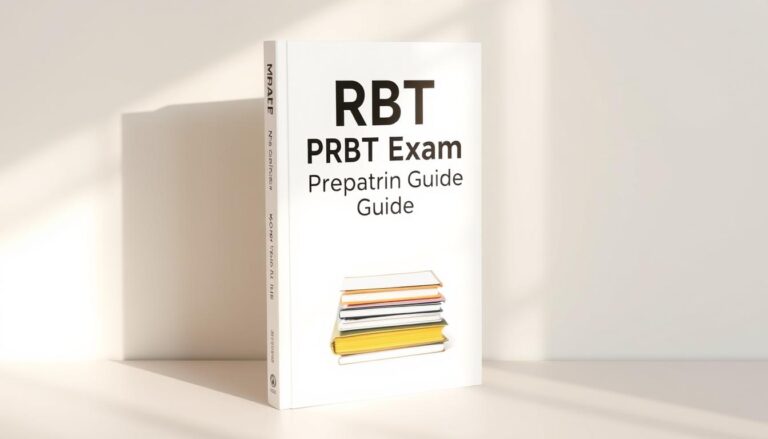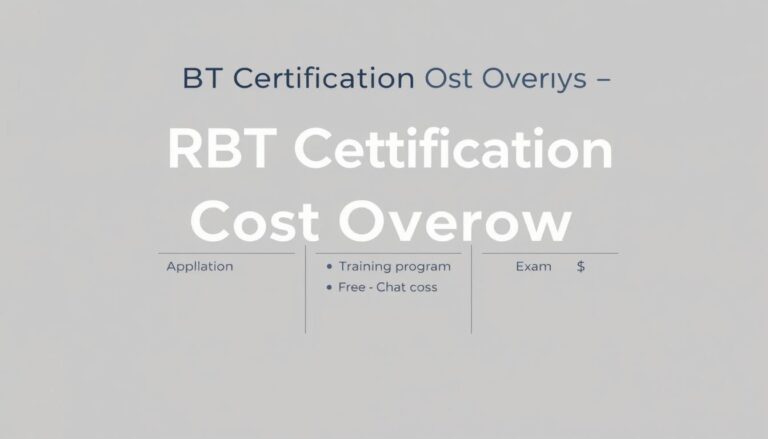How Long Can You Be a Behavioral Technician (RBT)?
Registered Behavior Technicians (RBTs) are key in helping people with autism and developmental disabilities. To understand how long one can be an RBT, we need to look at different career aspects. This career is both rewarding and has a lot of room for growth.
The length of an RBT’s career can vary a lot. It depends on how much they love their job, their work environment, and the chances they have to grow professionally. Those interested in this career will find it offers a lot of flexibility and chances to advance.
Many RBTs start with their certification and then keep growing in their careers. Some stay in the role for a few years, while others work for over a decade. They keep learning and make a big difference in people’s lives.
This guide will cover what affects how long someone can be an RBT. We’ll talk about certification, professional growth, and more. It’s designed to help both current and future RBTs plan their careers well.
Understanding the Role of a Registered Behavior Technician
Registered Behavior Technicians (RBTs) are key in helping people with behavioral challenges, like autism. They work with Board Certified Behavior Analysts (BCBAs) to create and follow plans. They also give direct support to their clients.
The time an RBT works can change based on their career and goals. They start with a solid base of training and certification.
Core Responsibilities and Daily Tasks
RBTs do many important tasks that need patience, skill, and commitment. Their main jobs are:
- Implementing behavior intervention plans
- Collecting and recording behavioral data
- Supporting skill development
- Assisting clients in social and communication skills
- Collaborating with behavior analysts and support teams
Basic Requirements for RBT Certification
To be an RBT, you need to meet certain requirements. These affect how long you can work as an RBT:
| Requirement | Details |
|---|---|
| Age | At least 18 years old |
| Education | High school diploma or equivalent |
| Training | 40-hour behavior technician training program |
| Background Check | Clean criminal background |
Working Environment and Settings
RBTs work in many places, which helps them grow in their careers. Common places include:
- Special education classrooms
- Autism treatment centers
- Private homes
- Community-based programs
- Rehabilitation facilities
This variety in work settings lets RBTs have a fulfilling and varied career in behavioral health support.
The Typical Career Duration of an RBT Professional
To understand how long an RBT works, we need to look at their career path. Most RBTs have careers that change a lot and last different lengths of time.
The average time an RBT works is between 2-5 years. Several things can affect how long they stay in the job. These include:
- How much they love their work
- Chances to grow professionally
- The job’s emotional and physical demands
- How much they want to grow in their career
Many RBTs see their job as a way to move up in the field of applied behavior analysis. Here are some important points about how long RBTs work:
- Newcomers usually stay 1-3 years
- Those who really care about their work might stay 5-7 years
- Having chances to move up in their career helps them stay longer
Younger RBTs are often more flexible with their careers. Those with good education and training tend to work longer. They explore many areas in behavioral health services.
The job world keeps changing, opening up new chances for RBTs who are dedicated. They make a big difference in people’s lives.
Factors Affecting RBT Career Longevity
Registered Behavior Technicians (RBTs) face unique challenges that impact their long-term prospects. Understanding the sustainability of the RBT profession requires a deep dive into key factors. These factors shape career duration and success.
Professionals in this field must navigate a complex landscape. This landscape includes personal and professional demands. These demands can significantly influence their career trajectory.
Physical and Emotional Demands
RBT work presents intense physical and emotional challenges. These challenges test professional resilience. The role requires:
- High-energy interactions with clients
- Consistent emotional regulation
- Physical stamina for active interventions
- Emotional intelligence and patience
Work-Life Balance Considerations
Maintaining a healthy work-life balance is key for long-term sustainability in the RBT profession. Successful technicians develop strategies to manage:
- Stress management techniques
- Boundary setting with clients
- Personal wellness practices
- Time management skills
Professional Growth Opportunities
| Career Stage | Growth Potentials | Recommended Actions |
|---|---|---|
| Entry Level | Skill Development | Continuous Training |
| Mid-Career | Specialization | Advanced Certifications |
| Advanced Level | Leadership Roles | Supervisory Positions |
Strategic professional development is key to extending RBT career longevity. Proactive learning and skill enhancement can turn challenges into opportunities for growth and success.
RBT Certification Maintenance Requirements
Keeping your Registered Behavior Technician (RBT) certification up to date is a big deal. It takes ongoing effort and learning. The path to grow in your RBT career involves several important steps.
To keep your certification, you need to focus on three main areas:
- Annual Renewal Requirements
- Ongoing Supervision
- Continuous Professional Development
So, how long can you be a behavioral technician RBT? The Behavior Analyst Certification Board (BACB) has some rules to follow:
- Initial Competency Assessment: Pass the RBT exam
- Finish a 40-hour training program
- Pass a background check
- Get monthly supervision from a Board Certified Behavior Analyst (BCBA)
The recertification process has an annual renewal. This includes:
- Showing you’re working in the field
- Following ethical standards
- Getting the needed supervision hours
Every two years, you’ll need to do a big check-up. This includes a renewal test and a new background check. It makes sure you keep up with the best practices and care for your clients well.
Career Advancement Paths for RBTs
Registered Behavior Technicians (RBTs) have many chances to grow their careers. Their job can be a starting point for big steps in applied behavior analysis. This field is full of opportunities for growth.
There are many ways for RBTs to increase their career chances. They can make a big difference in healthcare and education.
Educational Advancement Options
RBTs can get more education to move up:
- Get a Bachelor’s degree in Psychology or a related field.
- Work towards Board Certified Behavior Analyst (BCBA) certification.
- Take graduate courses in Applied Behavior Analysis.
Specialization Opportunities
RBTs can become experts in certain areas:
- Autism Spectrum Disorders
- Developmental Disabilities
- Organizational Behavior Management
- Clinical Research
Leadership Roles
With more experience and training, RBTs can become leaders:
- Clinical Supervisor
- Program Coordinator
- Training Director
- Clinical Director
These paths show the exciting possibilities in the behavioral health field. RBTs have many chances to grow and develop personally and professionally.
How Long Can You Be Behavioral Technician RBT

The length of time you can work as an RBT varies. It depends on your goals and what you want to achieve. Most RBTs stay in the job for 2-5 years. They often find new paths in applied behavior analysis.
Several factors affect how long you can be an RBT:
- How much you enjoy your job
- Opportunities for growth and learning
- Keeping up with certification needs
- Your work environment
Many RBTs see this job as a way to move up in behavioral health. The how long can you be a behavioral technician RBT question has no one-size-fits-all answer. With good planning, you can keep working as an RBT for a long time.
To stay in the field longer, RBTs get more certifications and skills. They also look for special training. These steps help them grow in their careers and find new opportunities in behavioral health.
- Entry-level jobs usually last 2-3 years
- More experienced RBTs can keep their certification for 5+ years
- How far you go depends on your dedication
The field of applied behavior analysis is expanding. It offers great chances for RBTs who keep learning and growing.
Job Market Outlook for RBT Professionals
The job market for Registered Behavior Technicians (RBTs) is looking up. There are more job opportunities coming. This is because more people are learning about autism and behavioral health needs.
Looking ahead, here’s what you need to know about RBT jobs:
- Job growth is expected to be around 8-12% in behavioral health.
- More jobs are opening up in schools, clinics, and private practices.
- There are more chances to work in cities and suburbs too.
Where you live affects your job chances. Places with more people and better healthcare tend to have more jobs. California, Texas, and Florida are good places to look for work.
Here are some places where RBTs can find jobs:
- Special education programs
- Autism treatment centers
- Private therapy practices
- Rehabilitation facilities
- Community mental health organizations
If you’re looking for a stable career, RBT is a great choice. The demand is high, pay is good, and the work is rewarding. It’s a promising field for those in behavioral health.
Salary Progression and Experience Correlation
Knowing how much money a Registered Behavior Technician (RBT) makes is key to understanding their career. How much they earn changes as they grow and get better at their job.
RBTs earn different amounts based on several important factors. At the start, they make entry-level wages. But, as they gain more experience, their pay can really go up.
Entry-Level vs. Experienced RBT Compensation
The money RBTs make is closely tied to how long they’ve been working. Newcomers usually earn between $30,000 to $35,000 a year. But, those with 3-5 years of experience can see a big jump in their salary:
- 1-2 years experience: $35,000 – $40,000
- 3-5 years experience: $40,000 – $48,000
- 5+ years experience: $48,000 – $55,000
Regional Salary Variations
Where you live also affects how much you earn. Cities and places with higher living costs often pay more. States like California, New York, and Massachusetts usually offer better pay than rural areas.
| Region | Average Annual Salary |
|---|---|
| West Coast | $45,000 – $55,000 |
| Northeast | $42,000 – $52,000 |
| Midwest | $37,000 – $45,000 |
| Southern States | $35,000 – $42,000 |
Getting better at your job, getting extra certifications, and learning new skills can also increase your earnings. This makes the RBT job a great choice for a long-term career with good financial growth.
Common Challenges in Long-term RBT Careers
Registered Behavior Technicians (RBTs) face unique challenges that can affect their long-term careers. It’s important to understand these obstacles to keep their careers rewarding and fulfilling.
The biggest challenges RBTs face include:
- Emotional Exhaustion: Working with individuals with developmental challenges can be very taxing
- Physical Strain: The constant movement and hands-on work can be physically demanding
- Potential Burnout: Dealing with intense client interactions requires a lot of emotional strength
- Limited Career Progression: Starting with a basic certification can feel limiting without more training
Professional growth is key to overcoming these challenges. RBTs can ensure a long-lasting career by taking care of themselves and learning continuously.
Here are some strategies for lasting success:
- Regular supervision and mentorship from professionals
- Using personal stress management techniques
- Continuing to learn and get more certifications
- Building strong support networks
By tackling these challenges head-on, RBTs can build lasting, fulfilling careers in behavioral intervention. Their ability to overcome obstacles is what ensures long-term success in this important field.
Strategies for Sustainable RBT Career Growth
Registered Behavior Technicians (RBTs) can grow their careers by using smart development plans. How long you can work as an RBT depends on your dedication to learning and growing.
Successful RBTs plan ahead and improve their skills. A strong development plan is key for lasting success in this field.
Professional Development Tips
- Pursue additional certifications in specialized behavioral intervention techniques
- Attend workshops and conferences focused on applied behavior analysis
- Seek mentorship from experienced professionals in the field
- Stay updated with the latest research and technological advancements
Networking Importance
Having a strong network can open up more career opportunities. Good networking is about more than just collecting cards.
| Networking Strategy | Potential Benefits |
|---|---|
| Professional Associations | Access to job opportunities, latest research, and professional resources |
| Online Professional Platforms | Connect with peers, share knowledge, and discover career growth options |
| Local Meetups and Conferences | Direct interaction with industry experts and possible employers |
Keep learning and build a strong network to extend your RBT career. Investing in your growth leads to a rewarding career in behavioral intervention.
Impact of Industry Changes on RBT Career Duration
The world of behavioral technician jobs is always changing. Registered Behavior Technicians (RBTs) need to keep up with these changes to stay in their jobs and be relevant.
New technology is changing the RBT job. Digital tools and new ways to track progress are making the job more complex. RBTs must learn new skills and adapt to these changes fast.
- Emerging digital assessment technologies
- Advanced data tracking systems
- Telehealth intervention methods
Now, how long RBTs can stay in their jobs depends on a few key things:
- Continuous professional development
- Being good with technology
- Being open to new ways of treating problems
Those who keep learning and use new tech will do well. Being able to learn and change is key to success in this field.
There are more training programs and updates for RBTs now. They need to keep learning to stay ahead in the fast-changing healthcare world.
- Regular certification renewals
- Advanced training workshops
- Professional networking opportunities
The future of RBT jobs will go to those who mix old-school behavioral analysis with new tech.
Benefits of Long-term RBT Career Commitment

Choosing a long-term career as a Registered Behavior Technician (RBT) brings many rewards. It offers chances for personal and professional growth in applied behavior analysis. This career path is rich with opportunities.
There are many benefits to a long RBT career:
- Deep expertise development in behavioral intervention strategies
- Meaningful connections with clients and their families
- Potential for advanced leadership roles
- Enhanced understanding of individual client needs
Those who stick with their RBT career find great personal fulfillment. Building long-term relationships with clients allows technicians to witness profound developmental progress. This deep connection helps them understand behavioral intervention techniques better.
Dedicated RBTs have many career paths to explore. They can become mentors, supervisors, and key team members in behavioral health. Their experience helps new professionals in the field.
Staying committed to professional growth is essential in a long RBT career. Those who keep learning, attending workshops, and staying updated with research make a big difference. They also achieve their career goals.
Alternative Career Paths for Experienced RBTs
Registered Behavior Technicians (RBTs) have a special skill set. This opens doors to many career paths in healthcare and behavioral science. As they grow in their careers, they can explore new and exciting opportunities.
- Board Certified Behavior Analyst (BCBA) Certification
- Special Education Consulting
- Healthcare Administration
- Clinical Research Coordination
Related Healthcare Positions
RBTs can move into healthcare roles that value their skills. Some great options include:
- Mental Health Counseling: Using direct intervention skills
- Autism Support Specialist
- Developmental Disability Coordinator
- Child Welfare Case Manager
Private Practice Opportunities
Entrepreneurial RBTs can start their own practices. This lets them use their skills while being their own boss.
They can offer individual therapy, support in schools, or workshops for families and schools.
Maintaining Professional Motivation as an RBT
Keeping motivation up is key for a long career as an RBT. Those in behavioral therapy need ways to keep their passion strong. This helps them stay in the field for the long haul.
There are many ways to stay motivated. Registered Behavior Technicians can use several strategies to stay engaged:
- Set clear personal and professional development goals
- Seek regular supervision and mentorship
- Participate in continuous learning opportunities
- Practice self-care and emotional resilience
- Connect with professional support networks
Growing professionally keeps the job exciting. RBTs can find new ways to make their work interesting:
| Growth Strategy | Impact on Motivation |
|---|---|
| Advanced Certifications | Increases skill set and career opportunities |
| Specialized Training | Provides new challenges and knowledge |
| Professional Conferences | Offers networking and inspiration |
| Research Involvement | Deepens understanding of behavioral techniques |
Reflecting on the meaningful impact of your work can be the most powerful motivational tool. Every time you work with clients, you have a chance to change their lives. This can keep RBTs passionate and dedicated to their work.
Motivation is always changing. By always learning, seeking help, and seeing the big picture of behavioral intervention, RBTs can have a rewarding career. It’s a career that keeps them inspired and challenged.
Work Environment Evolution Over Time

The length of a RBT’s career depends a lot on how work environments change. Registered Behavior Technicians see big changes as they get more experience and skills.
In the early days, RBTs work closely with clients and are watched closely. As they get better, their work becomes more varied and complex. They move from being closely supervised to working more on their own.
- Initial phase: High supervision and structured learning
- Mid-career: Increased client complexity and independence
- Advanced stage: Strategic intervention and mentorship opportunities
As RBTs get more experience, their job changes too. They start working with teams, training new staff, and creating special plans for clients. This growth helps them stay in the field longer.
Work environments change with new tech, different ways of helping, and working with other fields. RBTs who keep up with these changes can enjoy their job for a long time.
- Embrace continuous learning
- Stay updated with technological tools
- Develop interdisciplinary communication skills
Knowing about these changes helps RBTs plan their career well. It keeps them interested and growing in the field of behavioral therapy.
Conclusion
The path of a Registered Behavior Technician (RBT) is full of flexibility and growth. Your job duration isn’t set by rules but by your passion and skill growth. It’s all about how much you want to learn and improve.
Success in this field comes from keeping a strong professional mindset. Always be ready to learn, adapt, and help those with autism and developmental challenges. Each step you take adds to your skills and opens new doors for you.
Being a successful RBT is more than a job—it’s a calling. It needs dedication, empathy, and the ability to bounce back. By growing professionally, staying updated, and improving your people skills, you can have a fulfilling career in behavioral health.
Your future as an RBT is as big as your dreams and determination. Seize every chance, face every challenge, and make a real difference in the lives of those you help.







